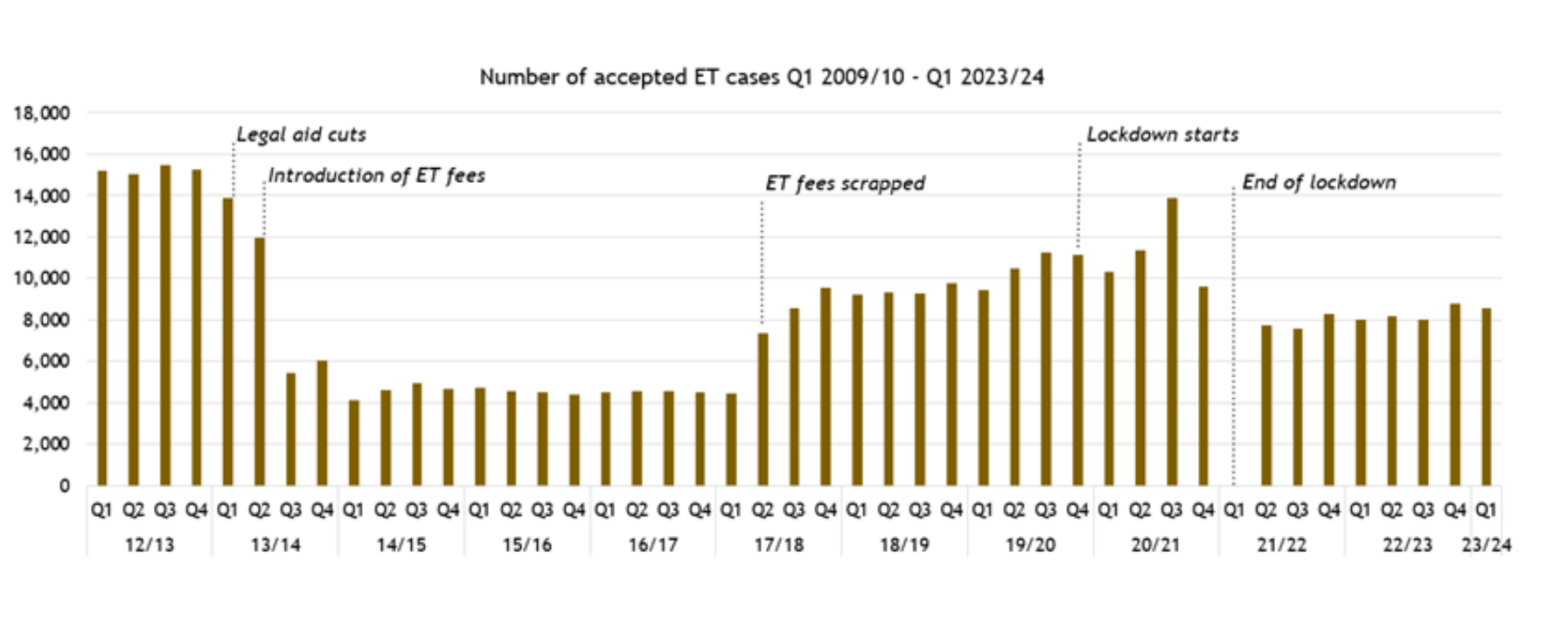Employment justice must be accessible to all: our submission to the Ministry of Justice's Employment Tribunal fees consultation
The Ministry of Justice is seeking to reintroduce fees for workers bringing a claim to the Employment Tribunal or lodging an appeal with the Employment Appeals Tribunal. This privatisation of access to justice would deal a major blow to vulnerable workers and their advocates, and undermine the public value of employment justice, while doing little to alleviate the actual pressures the tribunal system is facing.
We’ve submitted evidence to the Ministry of Justice, in the hope of convincing the government to reverse this plan.
What fees are the Ministry of Justice proposing introducing to Employment Tribunals?
The Ministry of Justice proposes introducing a £55 claim issue fee, payable by people upon bringing a claim to the Employment Tribunal, and an additional £55 fee to appeal the decision at an Employment Appeals Tribunal.
While ministers may believe that the proposed fee of £55 is affordable to all, we know that this is not the case. For those facing poverty or destitution, this is money that could otherwise be spent feeding their family, making rent, or buying school uniforms. Compare this fee to the Universal Credit standard allowance of £292.11 per month for single claimants under the age of 25, and £368.74 for those over 25 years of age. A fee of £55 is almost a fifth of that allowance. For those on the lowest incomes, or earning no income, who rely on Universal Credit to get by, it is enough to act as a deterrent to seeking employment justice.
We, and other charities in the workers’ rights sector, are committed to supporting our clients through the Employment Tribunal process. However, expecting charities to cover the cost of fees would add unaffordable financial pressure to a sector that is already overstretched.
What happened last time the government introduced Employment Tribunal fees?
This is not the first time the government has tried to shift the cost of justice away from the taxpayer, and onto claimants or charities. In 2013, the Employment Appeal Tribunal Fees Order introduced a fee regime which categorised Employment Tribunal claims into ‘Type A’ (simple) or ‘Type B’ (complex) claims. So-called simple claims attracted an issue fee of £160 and a hearing fee of £230, while complex claims attracted an issue fee of £250 and a hearing fee of £950. Separately, the EAT attracted a £400 issue fee and a £1200 hearing fee, totalling £1600 in fees.
Before the introduction of fees, the number of cases taken to employment tribunals stood at 14,000 in Q1 2013, but this plummeted to just 4,000 a year later, a reduction of 71%. Contrary to the Ministry of Justice’s expectation, the share of unmeritorious claims increased after fees were introduced.

The trade union Unison took the government to court and in 2017, four years after the fees were first introduced, the Supreme Court reversed the decision. In a groundbreaking judgement, the Supreme Court quashed the Fees Order as it held that the fees were unlawful. First, they were in practice unaffordable. Second, they rendered pursuing non-monetary and low-value claims futile and irrational, which effectively prevented access to justice. Third, the fee structure proposed was found to be indirectly discriminatory against women and individuals with protected characteristics.
Contrary to the Ministry of Justice’s claim that they have learnt the lessons of the past, the £55 fee proposed now is still likely to put workers off bringing a claim to the Employment Tribunal, and render low-value claims irrational, with migrant workers, non-unionised workers, women and low-income workers most at risk. It also does little to fix the real problems affecting the Employment Tribunal system.
Why the proposed fees are unlikely to fix the Employment Tribunal system
There is no doubt about the fact that the Employment Tribunal system needs urgent support. Workers must wait around 1 year or more for their claim to be heard, with the system contending with a backlog of 470,000 outstanding claims at the end of the 2023/24 financial year. Employment Tribunal judgements also have a notoriously low enforcement rate. In many of our cases workers were unable to recover the compensation they were awarded by the tribunal, after employers dissolved the companies.
However, imposing fees is not the answer. There is no evidence that fees will deter unmeritorious claims as Employment Tribunals already have robust powers to strike these out at an early stage. In fact, the previous time the Ministry of Justice imposed fees, the share of unmeritorious claims did not decrease, as expected, but actually increased.
The fees would also not address the issue of resourcing. The government’s own Impact Assessment, published with this consultation, estimates that the introduction of Employment Tribunal and appeals fees would generate between £1.3 to £1.7 million per year. These projected benefits amount to just 2% of the current direct running cost of the tribunals and appeals (which stands at £80 million). This is a negligible saving that hardly warrants the social cost it is likely to generate for workers.
In our experience, imposing fees even at a level that may seem affordable on the surface, is likely to entrench workers' exclusion from employment justice by preventing vulnerable workers from bringing a claim; increase pressures facing the third sector; fail to alleviate pressures on the tribunal system; and generate negligible savings for the His Majesty's Courts and Tribunals Service. We urge the government to rethink these short-sighted and inequitable plans.
